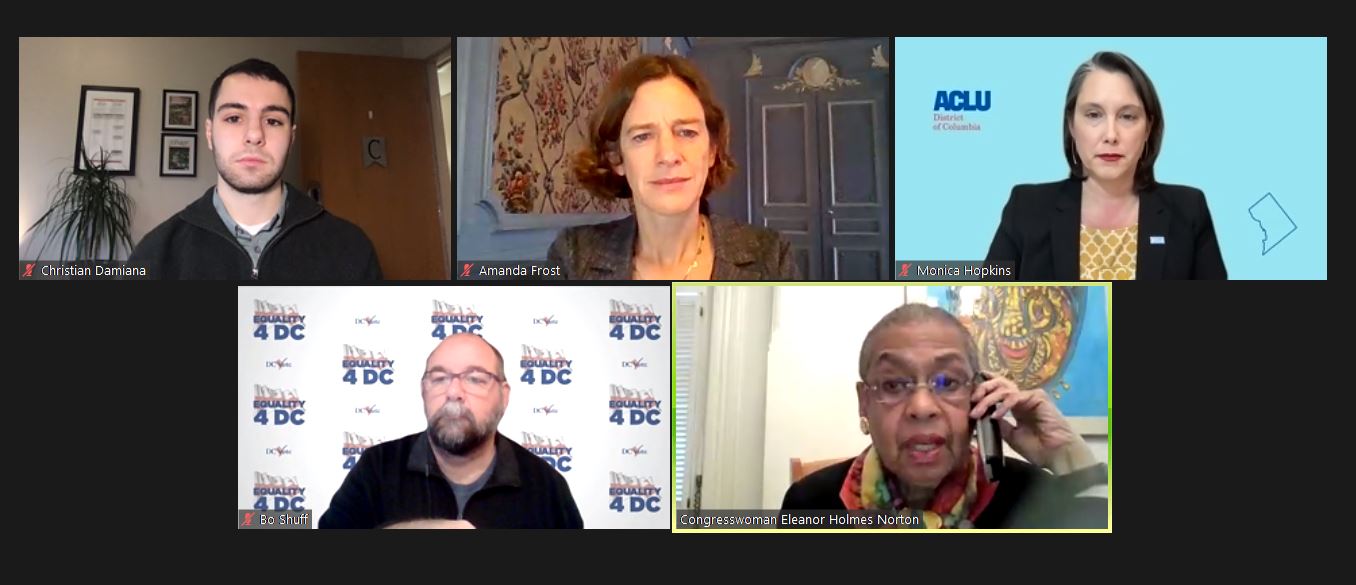AUWCL Welcomes Congresswoman Norton for Discussion on DC Statehood
March 19, 2021

The ongoing movement to achieve statehood for Washington, DC has never been closer to achieving its goal. On Thursday, March 18, American University Washington College of Law’s Program on Law and Government hosted “The Road to 51: The Past, Present, and Future Of The Struggle For DC Statehood.”
The event featured insight from various panelists at the forefront of the fight for DC statehood, including Congresswoman Eleanor Holmes Norton, whose District of Columbia statehood bill will be discussed during a Committee on Oversight and Reform hearing March 22. The discussion – moderated by Ann Loeb Bronfman Distinguished Professor of Law Amanda Frost – tackled the legal, political, and policy considerations around the fight for statehood, described the obstacles that have thwarted the effort in the past, and provided vision on a viable pathway going forward.
Now in her fifteenth term as the Congresswoman for the District of Columbia, Congresswoman Norton is the Chair of the House Subcommittee on Highways and Transit and serves on two committees, the Committee on Oversight and Reform (COR) and the Committee on Transportation and Infrastructure. Last month she announced COR will hold a hearing next week on her proposed DC statehood bill (H.R. 51), which has 213 cosponsors.
“We have more than enough cosponsors to pass the bill, just as we did last time,” Norton said, adding that the “Data for Progress polls are very promising” and show that “we are getting closer to DC statehood” – 54% of the American people now support the effort. The theme that most resonates with people is “taxation without representation,” Norton explained.
“How do we account for these statistics? Because of our hearings we had in June, and how they educated the people….It was not until these hearings exposed the real facts that were people astonished to learn things like District residents pay the highest taxes per capita, or that our budget is larger than that of 12 states. Or that we have a higher gross domestic product than any state, and that our bond rating is better than 35 states. It’s why these hearings, more than anything else, have helped.”
One of the main questions asked is whether, said Monica Hopkins, executive director of the ACLU of the District of Columbia. The U.S. Constitution’s District and Federal Enclaves Clause creates the federal District, and grants Congress the power to change the size of the District as long as it is smaller than 10 square miles – and the proposals in both the House and Senate bills makes it smaller than 10 square miles, Hopkins said.
The Constitution Admissions Clause says you cannot create a state within the jurisdiction of another state. “That is not what is happening here, there is a clearly cut out federal enclave,” Hopkins said. “The second issue is whether or not this land must be retroceded to Maryland. But Maryland ceded this land to the federal government for the creation of the District of Columbia, and does not retain a reversionary interest in this land. So Congress can do what it wants with this land.”
Advocacy for this pressing issue is all about education, according to Bo Shuff, executive director of DC Vote. The organization’s cross-country education initiatives have led to an increase of support for statehood – while opposition has remained stagnant, he said, those that are undecided or uninformed continue to move toward support of the effort.
“The number one challenge is awareness, and events just like this one are the strongest way we move this issue because people start to recognize there is a problem here, and that statehood is the only solution that is permeant and addresses all the challenges,” Shuff said.
Christian Damiana, president of American University Students for DC Statehood, said there are two key things students can do to push the DC statehood issue forward: show up and speak out. Along with going to hearings and related rallies, participating in town halls with their state representative, and voicing their position on social media to spread the world, Damiana said students can also “take their concerns to the ballot box and say ‘you haven’t listened and shown up for my concerns’– and now it’s time to make a change.”
###
About American University Washington College of Law
In 1896, American University Washington College of Law (AUWCL) became the first law school in the country founded by women. More than 120 years since its founding, this law school community is grounded in the values of equality, diversity, and intellectual rigor. AUWCL’s top ranked specialty programs – in Clinical Legal Education, Trial Advocacy, International Law, Health Law and Policy, Intellectual Property, and Part-Time JD –and dedicated faculty provide its JD, LL.M., and SJD students with the critical skills and values to have an immediate impact as students and as graduates, in Washington, DC, the nation, and the world.
